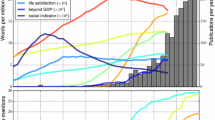Abstract
In 2009 the Stiglitz Commission presented its report on the Measurement of Progress in Societies. The report was commissioned by President Sarkozy of France in 2008. Among its members, the Commission had five Nobel laureates. The report emphasizes three areas which require further attention by statistical offices and policy makers: A better measurement of the domestic production of goods and services, the incorporation of sustainability considerations, and the measurement of quality of life. This paper argues that the report constitutes good news; however, if further actions are not undertaken the report may have little impact in the study and measurement of quality of life and, specially, in the quality of life of ordinary people. The paper makes some recommendations which, in the opinion of the author, could enhance the impact of the report on establishing the pursuit of quality of life as a main social aim.
Similar content being viewed by others
References
Andrews, F. M., Bulmer, M., Ferris, A. L., Gershuny, J., Glatzer, W., Noll, H.-H., et al. (1989). Whatever happened to social indicators? A symposium. Journal of Public Policy, 9(4), 399–450.
Andrews, F. M., & Withey, S. B. (1976). Social indicators of well-being. New York: Plenum Press.
Argyle, M. (2001). The psychology of happiness. Hove, East Sussex: Routledge.
Clark, A. E., & Oswald, A. J. (1994). Subjective well-being and unemployment. The Economic Journal, 104, 648–659.
Cummins, R. (1998). Directory of instruments to measure quality of life and cognate areas (4th ed.). Melbourne: School of Psychology, Deakin University.
Diener, E. (2002). “Will money increase subjective well-being?”. Social Indicators Research, 57, 119–169.
Diener, E., & Oishi, S. (2000). Money and happiness: Income and subjective well-being across nations. In E. Diener & E. Suh (Eds.), Subjective well-being across cultures. Cambridge: MIT Press.
Easterlin, R. A. (1974). Does economic growth improve the human lot? Some empirical evidence. In P. A. David & M. W. Reder (Eds.), Nations and households in economic growth (pp. 89–125). London: Academic Press.
Easterlin, R. (2001). Subjective well-being and economic analysis: A brief introduction. Journal of Economic Behavior & Organization, 45, 225–236.
Frey, B., & Stutzer, A. (2001). Happiness and economics: How the economy and institutions affect human well-being. Princeton: Princeton University Press.
Hagerty, M., Cummins, R., Ferriss, A., Land, K., Michalos, A., Peterson, M., et al. (2001). Quality of life indexes for national policy: Review and agenda for research. Social Indicators Research, 55, 1–96.
Kahneman, D., Diener, E., & Schwarz, N. (Eds.). (1999) Well-being: the foundations of hedonic psychology. New York: Russell Sage Foundation.
Rojas, M. (2007). The complexity of well-being: A life-satisfaction conception and a domains-of-life approach. In I. Gough & A. McGregor (Eds.), Researching well-being in developing countries: From theory to research (pp. 259–280). Cambridge: Cambridge University Press.
Rojas, M. (2010). “Quality of Life: Conceptualization comes First”, Inter American Development Bank, working paper.
Sen, A. (1979). Equality of what? Tanner lecture on human values. California: Stanford University.
Sen, A. (1993). Capability and well-being. In M. C. Nussbaum & A. Sen (Eds.), The quality of life. Oxford: Oxford University Press, United Nations University.
Van Praag, B. M. S., & Frijters, P. (1999). The measurement of welfare and well-being: The leyden approach. In D. Kahneman, E. Diener, & N. Schwarz (Eds.), Well-being: The foundations of hedonic psychology. New York: Russel Sage.
Veenhoven, R. (1988). The utility of happiness. Social Indicators Research, 20, 333–354.
Veenhoven, R. (1992). Happiness in nations. Rotterdam: Erasmus University.
Veenhoven, R. (2000). The four qualities of life: Ordering concepts and measures of the good life. Journal of Happiness Studies, 1, 1–39.
Author information
Authors and Affiliations
Corresponding author
Rights and permissions
About this article
Cite this article
Rojas, M. The ‘Measurement of Economic Performance and Social Progress’ Report and Quality of Life: Moving Forward. Soc Indic Res 102, 169–180 (2011). https://doi.org/10.1007/s11205-010-9737-x
Accepted:
Published:
Issue Date:
DOI: https://doi.org/10.1007/s11205-010-9737-x




